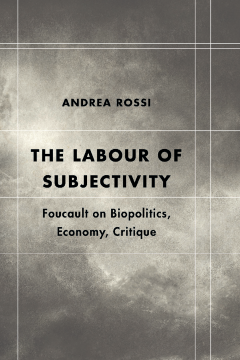
Additional Information
Book Details
Abstract
Michel Foucault defined critique as an exercise in de-subjectivation. To what extent did this claim shape his philosophical practice? What are its theoretical and ethical justifications? Why did Foucault come to view the production of subjectivity as a key site of political and intellectual emancipation in the present?
Andrea Rossi pursues these questions in The Labour of Subjectivity. The book re-examines the genealogy of the politics of subjectivity that Foucault began to outline in his lectures at the Collège de France in the late 1970s and early 1980s. He explores Christian confession, raison d’état, biopolitics and bioeconomy as the different technologies by which Western politics has attempted to produce, regulate and give form to the subjectivity of its subjects. Ultimately Rossi argues that Foucault’s critical project can only be comprehended within the context of this historico-political trajectory, as an attempt to give the extant politics of the self a new horizon.
Everyone who thinks they have a secure and incisive grasp of the philosophical, ethical and political implications of Foucault on subjectivity should test their presuppositions by reading Andrea Rossi’s book. His innovative investigation is philosophically profound, ethically sensitive, and politically astute. Based on impressive close reading and full of quotable sentences, the book should be consulted whenever one wants to evoke Foucault on the historical production of subjectivity, on bio-political economy, on technologies of power, and on the particularities of the politics of the present.
Michael J. Shapiro, University of Hawai'i, Manoa
Andrea Rossi is a Research Fellow in the Department of Philosophy at Koç University.
Through an in-depth and skillful presentation of Foucault’s work, Andrea Rossi traces the genealogy of governmentality in the problematic relation between the subject and the norm, action and freedom, power and knowledge. His analysis offers a rigorous and original interpretation of the great Foucauldian themes of biopolitics, economy and the formation of modern subjectivity.
Roberto Esposito, Professor of Theoretical Philosophy, Scuola Normale Superiore, Italy
Andrea Rossi’s The Labour of Subjectivity: Foucault on Biopolitics, Economy, Critique is a daring read of Foucault’s key works from the later years of his lectures at the Coll`ege de France.... Rossi’s work is both a genealogical interrogation of power integrated into an inquiry into critique. This feat in relation to the works of Foucault is no simple trick and...Rossi accomplishes the task at hand.... Andrea Rossi’s book is a worthwhile read.
